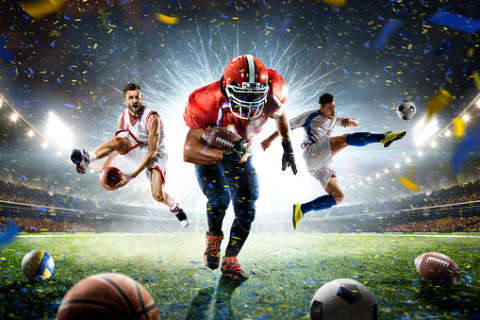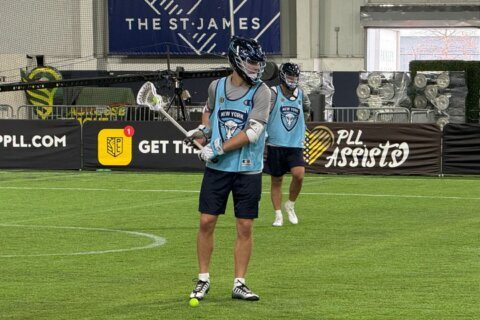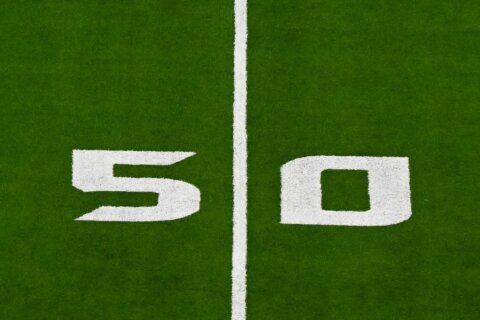WASHINGTON — Mark Ein is hobbling a bit.
He’s in great shape for a man in his early 50s, and always holds his own on the court when he plays alongside the professionals in the annual Washington Kastles Charity Classic. But the self-described running and tennis fanatic is limping up the steps to his companies’ offices in downtown D.C. this sunny spring afternoon, his recently torn meniscus just a month recovered from surgery.
It’s the same injury Roger Federer recently suffered, but after a month of his own rehab, the Swiss sensation was posting photos of himself running and jumping around as he worked his way back to the ATP tour. Ein asked his doctor why he wasn’t coming along quite so quickly.
“He said, ‘If you made $80 million playing tennis, you’d be doing this too,’” Ein said.
Ein didn’t make his money playing tennis. But like many who grew up as an athlete and made their fortune in the business world, Ein has invested some of it in the world of professional sports. He looked at his options, through the Big Four and beyond, but didn’t find what he was looking for. It wasn’t until he saw an old friend, Chris Haggard, play some of the best tennis of his life at Citi Open that he ever seriously considered the thought of investing in the sport he grew up playing.
Ein asked his friend, normally reserved, what had gotten into him as he watched him play up to and feed off the crowd.
Haggard told him: “It was team tennis. I realized fans really like it more when the players get engaged, and it makes me a better player when I do that. It’s been fantastic.”
That led to a discussion with World Team Tennis co-founder Billie Jean King. Nine years later, the Washington Kastles have won six championships, including each of the last five.
From the very beginning, Ein understood the value of fielding a winning team. The inaugural club went just 6-8, and though attendance was solid, the difference in the results on the court to the fan base was palpable to Ein.
“When we would win a match, people would leave the stadium energized and wanting to go out and socialize,” he said.
“There was a buzz, an energy, an excitement. And when we lost, the place was totally deflated. That sounds kind of obvious, and you kind of know it at some intellectual level. But until you experience it as the owner at an emotional level, and see how much people care, you feel like you want to give fans every opportunity to have a winning team.”
Ein doesn’t classify himself as that much of a competitive person. Rather, his desire to win seems more rooted in the desire not to let others down.
“That feeling is my drive,” he said. “I feel like, a lot of people have invested a lot of money and time in supporting us, and I feel like I owe it to them to give them the best chance to win.”
But in a venue such as WTT, championships aren’t the end-all and be-all. So, entering year 10, it’s worth asking what the Kastles are looking to achieve next, and what the future looks like.
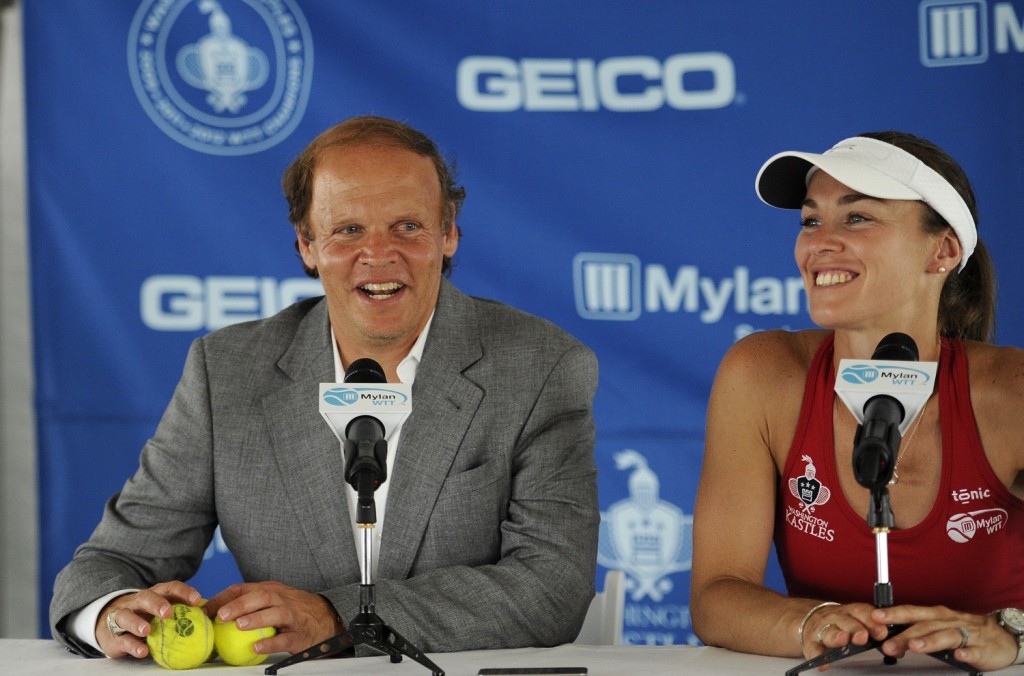
“When I first started this, it was a little daunting, but also a chance to take everything that I thought was great in pro events and put it into this thing that I was creating,” Ein said.
A native of the D.C. area, Ein grew up attending professional tennis events as they swung through the District, such as The Evening Star International Championship, the precursor to today’s Citi Open. He was also a ball kid at the Virginia Slims of Washington tournament, the last professional tennis to be played at the Smith Center before the Kastles moved in back in 2014. Perhaps fittingly, Billie Jean King took home both the singles and doubles title in 1974.
So when he sees players such as Arlington’s Denis Kudla or College Park’s Frances Tiafoe making names for themselves on tour, he takes immense pride in the fact that each were involved with the Kastles, attending matches as kids.
“I think about that too, a lot,” Ein said of WTT’s role in providing a forum to watch professionals play in person, something he considered invaluable as a child.
“You could go see the pros. You could be a ball kid. You could get involved and you could have that aspirational and inspirational link to the pros.”
There were some 45 pro tour events across the U.S. when Ein was growing up. That number is now down to just 11. That’s where the Kastles help fill the gap.
“I really believe that if you want to get kids to play a sport, you cannot underestimate the power of having a team in your city,” he said.
He compares the phenomenon to hockey, and the meteoric rise of youth players in the D.C. area since the Capitals moved from Landover to the heart of the city in the late 1990s.
“I want us to have the same effect on tennis, and I think we do,” he said. “I get stopped all the time around town by parents who tell me that their kids went to a Kastles match and got inspired to play the sport.”
But you don’t have to take his word for it. Kudla made his debut as a member of the Kastles last year. Ein tried to sign Tiafoe as well, but couldn’t fit within his schedule. Moving forward, you can bet that Ein will do everything in his power to be able to showcase that local connection, to have living proof on the court, winning matches.
“Any chance we can to have a local player, I think it’s great for us, it’s great for the community, it’s great for the player,” he said.
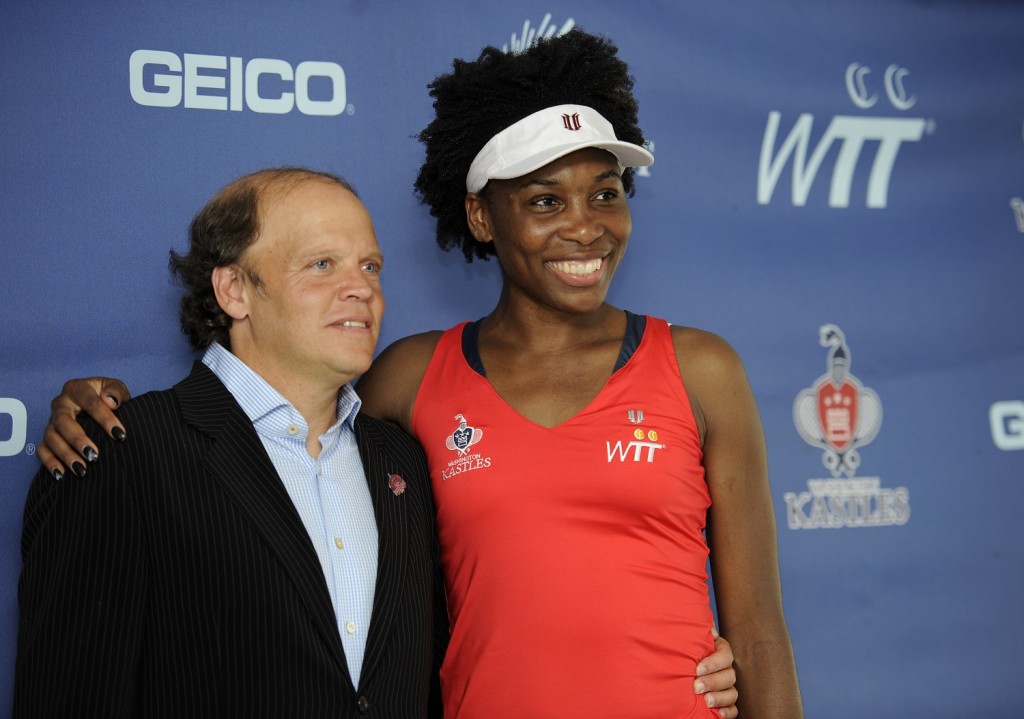
Ein’s office looks like something out of a movie set: the study of the mad genius, piles of notes, binders, Kastles merchandise and promotional items in every corner of the room. Even going into his 10th season at the helm of the franchise, it’s a testament to his attention to detail on every matter.
“At the end of the day, great sports teams, I think that’s what makes them great,” Ein said. “That the person in charge is looking at every little bit of it.”
The thought of owners meddling with every affair may raise a chill up the spine of some D.C. sports fans. But in Ein’s case, it doesn’t mean dictating starting quarterbacks or top draft picks, but rather making sure every detail of the fan experience is accounted for. That could mean a logo set, or the between-set entertainment, even the concessions.
“To me, the fan is like Mark Ein as a kid, growing up in Chevy Chase with his family. And I know that guy, and I want us to make this awesome for him,” he said.
That meticulousness has helped the Kastles grow, going from a 2,100-seat stadium in year one to regularly drawing 3,500 or more per game, and even reaching 4,500 once last season.
“In the context of sports that play at the Verizon Center that doesn’t seem like a lot,” Ein said. “In the context of tennis tournaments? It’s a really large crowd.”
At a number of major pro events, such as the ATP tour stop in Atlanta, the stadium doesn’t even hold that many spectators. So whether the Kastles are ever a big-enough draw to fill an arena such as the Verizon Center — as the International Premier Tennis League is doing over in Asia — the more people he can show a good time, the more he feels like his mission is succeeding.
“Sometimes I think we just don’t have enough fun activities in this city,” he said, comparing D.C. to Chicago and its bounty of outdoor summer events.
“Our founding principles were: Bring the city of Washington together; create a center of fun activities; promote the sport of tennis and physical fitness, and help local charitable partners. They don’t say anything about a tennis team winning championships, any of that stuff.”
Of course, that stuff helps. So will bringing Bob and Mike Bryan, the most successful American doubles duo of all time, to join the team this year. But Ein insists the championships are secondary to the reward of being able to see himself and his own childhood memories through the faces in the stands.
“My greatest memories of this are looking around the crowd, toward the end of the night, and seeing a totally full stadium of families having great summer nights together,” he said.
“I have so many memories of going to games with my family as a kid, and the feeling that you’re creating those memories for other people in your community are the best.”
That’s why Ein spends more time on the Kastles than any of his other business ventures, why he’s so proud to tell you that presidential senior adviser Valerie Jarrett once told him that the Kastles crowd was “the best melting pot of our city that I’ve ever seen,” why he’s as excited as ever about his team even though his season is competing against the Olympics this year, and why he’ll be ready to go for the home opener Aug. 1, with all his big stars in tow, new meniscus and all.

